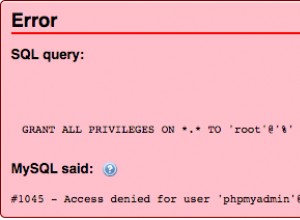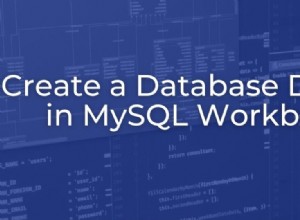La dichiarazione del caso è il mio migliore amico di sql. Hai anche bisogno di una tabella per il tempo per generare il tuo 0 giri in entrambi i mesi.
Le ipotesi si basano sulla disponibilità delle seguenti tabelle:
e
Esempio 1 senza righe vuote:
select
Category
,month
,SUM(CASE WHEN YEAR = 2008 THEN Revenue ELSE 0 END) this_year
,SUM(CASE WHEN YEAR = 2007 THEN Revenue ELSE 0 END) last_year
from
sales
where
year in (2008,2007)
group by
Category
,month
RESI:
Category | Month | Rev. This Year | Rev. Last Year
Bikes 1 10 000 0
Bikes 2 12 000 11 000
Bikes 3 12 000 11 500
Bikes 4 0 15 400
Esempio 2 con righe vuote:userò una query secondaria (ma altre potrebbero non farlo) e restituirò una riga vuota per ogni combinazione di prodotto e mese dell'anno.
select
fill.Category
,fill.month
,SUM(CASE WHEN YEAR = 2008 THEN Revenue ELSE 0 END) this_year
,SUM(CASE WHEN YEAR = 2007 THEN Revenue ELSE 0 END) last_year
from
sales
Right join (select distinct --try out left, right and cross joins to test results.
product
,year
,month
from
sales --this ideally would be from a products table
cross join tm
where
year in (2008,2007)) fill
where
fill.year in (2008,2007)
group by
fill.Category
,fill.month
RESI:
Category | Month | Rev. This Year | Rev. Last Year
Bikes 1 10 000 0
Bikes 2 12 000 11 000
Bikes 3 12 000 11 500
Bikes 4 0 15 400
Bikes 5 0 0
Bikes 6 0 0
Bikes 7 0 0
Bikes 8 0 0
Tieni presente che la maggior parte degli strumenti di reporting eseguirà questa funzionalità a campi incrociati o matrice e ora che ci penso SQL Server 2005 ha una sintassi pivot che lo farà anche.
Ecco alcune risorse aggiuntive.CASEhttps://www.4guysfromrolla.com/webtech/ 102704-1.shtml PIVOT di SQL SERVER 2005https://msdn.microsoft.com/en-us /libreria/ms177410.aspx




